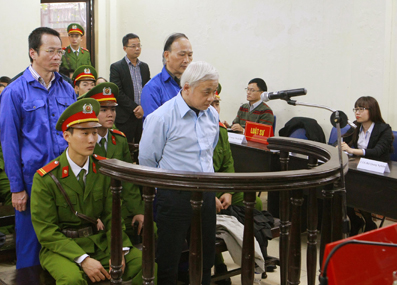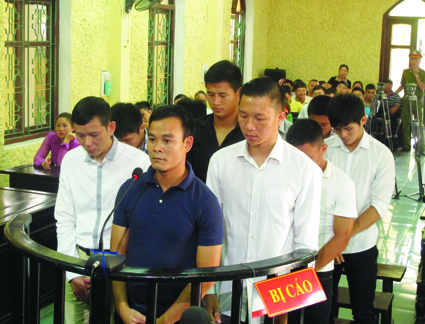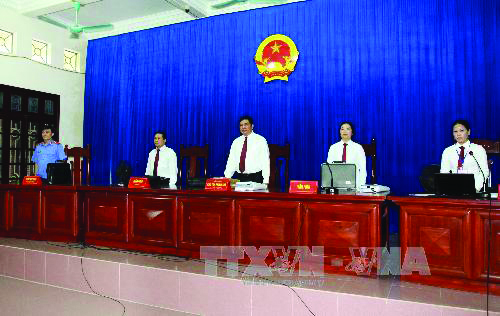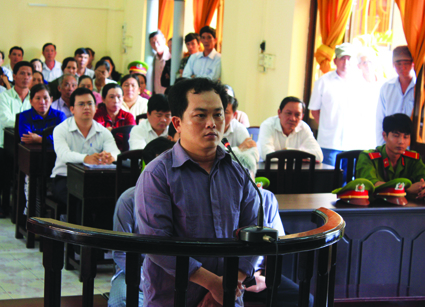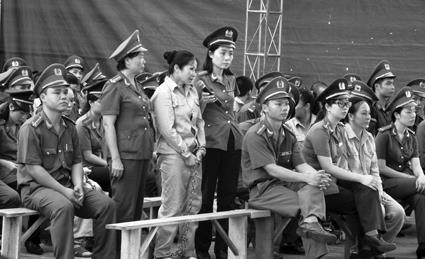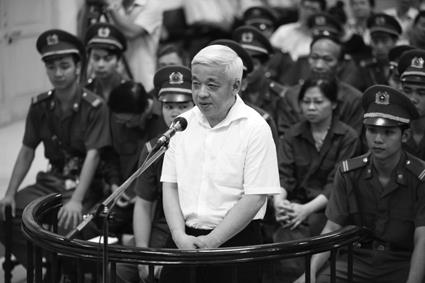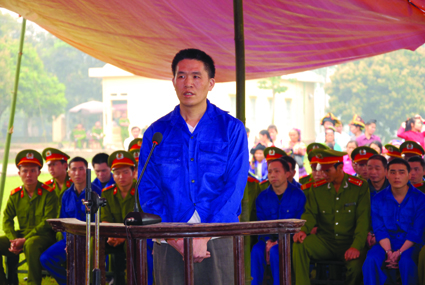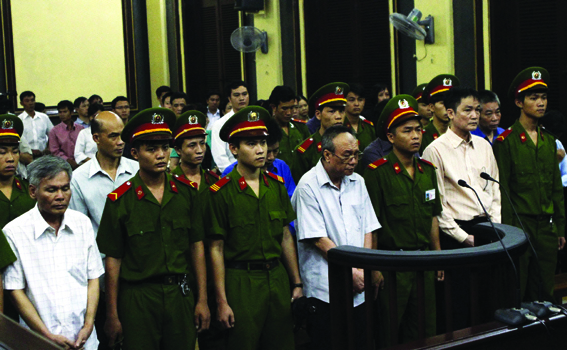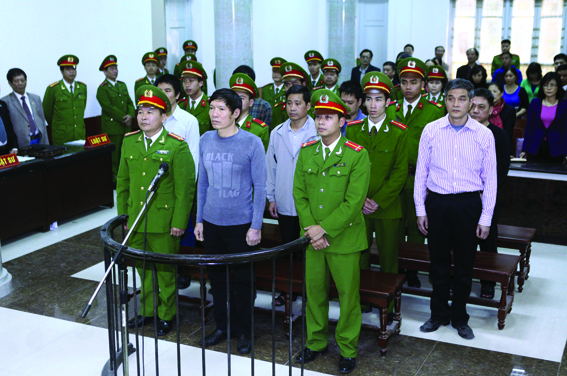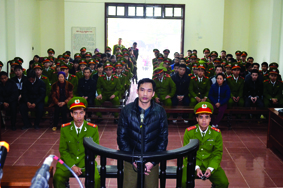 |
Defendant Vu Ngoc Son at the first-instance hearing for a drug-bribery brokerage-murder case in Hoa Binh province__Vu Ha/VNA |
Five requirements have been set for the formulation of the Law as follows:
(i) To institutionalize the Party’s guidelines and viewpoints on judicial reform, which affirm that courts assume the central position in, and their adjudication work is central to, judicial activities, and courts must be organized based on their jurisdiction, ensuring their independence in adjudication activities; and to create legal grounds for improving quality of judges, physical foundations, adjudication, exercise of judicial power and strict supervision of judicial activities;
(ii) To specify the 2013 Constitution’s provisions on the position, functions and duties of courts (Articles 102 and 104), ensuring the unity of the legal system, the enforceability of the Law and conformity with relevant treaties to which Vietnam is a contracting party;
(iii) To consolidate the 2002 Law on Organization of People’s Courts, the 2002 Ordinance on Judges and Assessors of People’s Courts, and the 2002 Ordinance on Organization of Military Courts;
(iv) To review the practical implementation of the above Law and Ordinances in order to address their limitations and loopholes, retain appropriate provisions and selectively learn experiences of foreign countries in the organization and operation of the court system and judges; and
(v) To be aligned with the renewal and strengthening of the organization and operation of procuracies and investigating agencies, ensuring the leadership by the Party and oversight by people-elected bodies and the people.
The Law has 98 articles arranged in 11 chapters, including:
Chapter I (Articles 1 thru 19): General provisions
Chapter II (Articles 20 thru 28): The Supreme People’s Court
Chapter III (Articles 29 thru 36): Superior people’s courts
Chapter IV (Articles 37 thru 43): Provincial-level people’s courts
Chapter V (Articles 44 thru 48): People’s courts of districts, towns, provincial cities and the equivalent
Chapter VI (Articles 49 thru 64): Military courts
Chapter VII (Articles 65 thru 83): Judges
Chapter VIII (Articles 84 thru 91): Assessors
Chapter IX (Articles 92 thru 94): Court clerks and examiners
Chapter X (Articles 95 thru 97): Assurance of operation of courts
Chapter XI (Article 98): Implementation provisions.
Article 1 of the Law stipulates: “This Law provides for functions, duties, powers and organizational structure of people’s courts; judges, assessors and other titles in people’s courts; and assurance of operation of people’s courts.”
Functions and duties of courts
The 2013 Constitution provides that people’s courts are judicial bodies, exercise judicial power and have the duty to safeguard justice, human rights and citizens’ rights, ensuring that the state power is unified and delegated to state agencies which coordinate with and control one another in the exercise of the legislative, executive and judicial powers. To concretize these constitutional provisions and institutionalize the Party’s judicial reform guidelines, Article 2 of the Law stipulates:
“In the name of the Socialist Republic of Vietnam, courts shall adjudicate criminal, civil, marriage and family, business, commercial, labor and administrative cases and settle other matters as prescribed by law; examine documents and evidences collected in proceedings in an adequate, objective and comprehensive manner; and base themselves on results of the adversarial process to make judgments and decisions on being guilty or not guilty of, to apply or not to apply penalties and judicial measures against, defendants, or to decide on property rights and obligations and moral rights.
Judgments and decisions of people’s courts which have taken legal effect shall be respected by agencies, organizations and individuals and shall be strictly observed by concerned agencies, organizations and individuals.
When adjudicating criminal cases, courts have the following powers:
+ To examine and conclude on the legality of procedural acts and decisions of investigators, procurators and lawyers in the course of investigation, prosecution and trial; to consider whether to apply, change or cancel deterrent measures; to cease or suspend cases;
+ To examine and conclude on the legality of evidences and documents collected by investigating agencies, investigators, procuracies and procurators; and those provided by lawyers, the accused, defendants and other procedure participants;
+ When finding it necessary, to return case files to procuracies for additional investigation; to request procuracies to add documents and evidences or request courts to examine, verify, collect or add evidences in accordance with the Criminal Procedure Code;
+ To request investigators, procurators and other people to present matters related to cases at hearings; to institute criminal cases when detecting omission of crimes;
+ To make decisions to exercise other powers in accordance with the Criminal Procedure Code.
During trial, courts shall detect and request competent agencies to consider and amend, supplement or annul legal documents which contravene the Constitution, laws, resolutions of the National Assembly, ordinances and resolutions of the National Assembly Standing Committee, to guarantee lawful rights and interests of individuals, agencies and organizations; and competent agencies shall reply to courts on results of handling such legal documents under law to serve as a basis for courts to settle cases.”
Article 2 also specifies the duties and powers of courts in settling civil matters and administrative cases, handling administrative violations, enforcing judgments, and applying law in adjudication.
Organization and operation of courts
The Law concretizes the fundamental principles prescribed in Article 103 of the Constitution, including such new principles as guarantee of adversarial process in trial and presumption of innocence. At the same time it includes a principle established in the Party’s resolutions and conclusions on judicial reform that people’s courts are independently organized based on their jurisdiction (Article 5).
Under Article 3 of the Law, the court system consists of the Supreme People’s Court; superior people’s courts; provincial-level people’s courts; and people’s courts of districts, towns, provincial cities and the equivalent; and military courts.
The Supreme People’s Court has a Judicial Council composed of between 13 and 17 judges of the Court.
Superior people’s courts and provincial-level people’s courts are allowed by the Law to establish family and juvenile tribunals to settle cases and matters related to family affairs and minors, in addition to their existing criminal, civil, administrative, economic and labor tribunals.
People’s courts of districts, towns, provincial cities and the equivalent may set up criminal, civil, family and juvenile, and administrative tribunals. However, the establishment of special tribunals in provincial-level and district-level courts must be based on specific requirements of duties, the pool of judges and civil servants of each court and decided by the Chief Justice of the Supreme People’s Court.
In case of necessity to additionally establish a special tribunal in superior people’s courts or provincial- or district-level courts to meet practical requirements of adjudication, the Chief Justice of the Supreme People’s Court will propose it to the National Assembly Standing Committee for consideration and decision.
Under the Law, the Supreme People’s Court will not conduct appellate trial but will only supervise adjudication activities of other courts and may conduct trial according to cassation or reopening procedure with a trial panel composed of five judges or all of its judges. Besides, it is tasked to review adjudication practices, ensure the uniform application of law in trial, manage the organization of courts, draft laws as assigned by the National Assembly and National Assembly Standing Committee, and provide professional training for judges, assessors and other court staffs.
Clause 1, Article 104 of the Constitution stipulates: “The Supreme People’s Court is the highest judicial body of the Socialist Republic of Vietnam.” In light of this, the Law stipulates in Clause 4, Article 22: “Cassation or reopening trial decisions of the Judicial Council of the Supreme People’s Court are the highest and cannot be protested against.”
In particular, the Law says that the Judicial Council of the Supreme People’s Court has the duty to “select, review and develop its cassation trial decisions and judgments and decisions of courts which have taken legal effect and are of standard nature into court precedents and publicize court precedents for courts to study and apply in trial.” (Point c, Clause 2, Article 22). This provision will help promptly settle problems arising in trial, address work overload and the slow issuance of documents guiding the application of law, as well as help people understand adjudication guidelines and predict settlement results of cases and matters related to their rights and interests. By studying court precedents and analyzing shortcomings in previous trials, judges can limit unjust judgments and prevent negative practices of procedure-conducting persons, lawyers and procedure participants in the settlement of cases.
Under the Law, superior people’s courts have the duty to conduct appellate trial with regard to first-instance judgments and decisions of provincial-level people’s courts which have not yet taken legal effect and are appealed or protested against. They will also conduct trial according to cassation or reopening procedures with regard to judgments and decisions of courts under their territorial jurisdiction which have taken legal effect but are protested against, with a trial panel composed of three judges or all members of the Judicial Committee of the superior people’s court.
People’s courts of districts, towns, provincial cities and the equivalent have the duty and power to conduct first-instance trial of almost all cases and matters falling under their jurisdiction and settle other matters prescribed by law.
Under Article 49 of the Law, military courts are organized in the People’s Army to adjudicate cases involving defendants who are in-service army men and other cases prescribed by law.
Judges and assessors
The Law has many changes in criteria, conditions and procedures for appointment of judges compared with the 2002 Law with a view to improving the quality of judges and materializing the Constitution’s provisions that judges of the Supreme People’s Court are approved by the National Assembly and appointed by the President; and judges of other courts are appointed by the President. A person who wishes to be appointed as a judge, in addition to meeting the conditions prescribed in the 2002 Law, must pass a judge selection examination and have engaged in legal work for at least five years (instead of four years under the 2002 Law).
Primary-level judges or intermediate-level judges who wish to be appointed to a higher rank must pass a rank promotion examination.
Under the Law, the term of office of judges is longer, with the initial term of office lasting five years. In case of being reappointed or appointed to a higher rank, a judge will have a subsequent term of 10 years in office.
The Law has some new important provisions to address existing problems in the organization and operation of assessors of people’s courts and ensure that the participation of assessors in trial is a method for the people to exercise judicial power and to supervise adjudication activities. Accordingly, courts will no longer manage assessors but “assessors shall be organized into juries that operate under regulations promulgated by the National Assembly Standing Committee.” (Clause 1, Article 91).-
